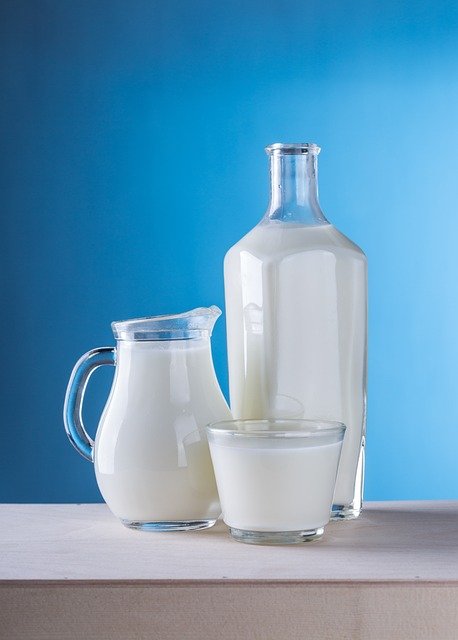Buffalo Milk: The Nutrient-Rich Superfood You Need to Know About
When it comes to nutritious beverages, buffalo milk often takes a backseat to its more common counterpart, cow’s milk. However, this rich and creamy milk deserves a prominent place in your diet due to its numerous health benefits. Buffalo milk is widely consumed in various parts of the world, particularly in South Asia, and is increasingly gaining popularity in other regions. In this comprehensive guide, we’ll explore the nutritional benefits of buffalo milk, its uses, and its impact on health. Learn why buffalo milk is a nutritious and sustainable choice, debunk common myths, and find out how to incorporate it into your diet.
What is Buffalo Milk?
Buffalo milk comes from domesticated water buffaloes, which are primarily found in regions of South Asia, such as India, Pakistan, and Nepal. Water buffaloes are also reared in countries like Egypt, Italy, and the Philippines. Buffalo milk is known for its creamy texture, white color, and higher fat content compared to cow’s milk. Due to its rich composition, it has been a staple in many households across Asia for centuries. In recent years, buffalo milk has started to gain recognition in other parts of the world, particularly in health-conscious communities looking for nutritious and wholesome alternatives to cow’s milk.
Buffalo milk is distinct in flavor and texture, making it an excellent choice for producing dairy products like ghee, butter, yogurt, and paneer. Its dense, creamy nature lends itself to a variety of culinary applications, making it a versatile ingredient in both traditional and modern recipes.
Nutritional Value of Buffalo Milk
Buffalo milk is a powerhouse of essential nutrients, offering a richer nutritional profile than cow’s milk. Here’s a closer look at its nutritional content-
- Higher Fat Content: Buffalo milk contains around 7-8% fat, which is significantly higher than cow’s milk, which typically has about 3-4% fat. This makes buffalo milk richer, creamier, and ideal for making dairy products like butter, cheese, and yogurt. The fat content also contributes to its satiating effect, keeping you fuller for longer.
- More Protein: Buffalo milk is a great source of high-quality protein, containing about 10-11% more protein than cow’s milk. This makes it an excellent choice for individuals who require more protein in their diet, such as athletes, bodybuilders, and growing children. Protein is essential for muscle repair, growth, and overall body function.
- Rich in Calcium: Buffalo milk is an excellent source of calcium, which is crucial for maintaining strong bones and teeth. A single glass of buffalo milk can provide a significant portion of your daily calcium requirement, helping to reduce the risk of bone-related issues like osteoporosis.
- Vitamin-Rich: Buffalo milk is packed with essential vitamins, particularly vitamins A and D. Vitamin A is important for maintaining healthy skin, vision, and immune function, while vitamin D helps in calcium absorption, bone health, and immune support.
- Lower Cholesterol: Despite its high-fat content, buffalo milk has lower cholesterol levels than cow’s milk. This makes it a healthier option for those concerned about heart health, as it helps in maintaining healthy cholesterol levels.
- Mineral-Rich: In addition to calcium, buffalo milk is rich in other essential minerals such as phosphorus, magnesium, and potassium, all of which play crucial roles in various bodily functions, including bone health, energy production, and maintaining electrolyte balance.
Health Benefits of Buffalo Milk
Buffalo milk is not just a nutrient-dense food; it also offers a multitude of health benefits that can contribute to overall well-being. Here are some of the key health benefits of incorporating buffalo milk into your diet:
- Boosts Immunity: The high levels of vitamins and minerals in buffalo milk strengthen the immune system, helping your body fight off infections and diseases. Vitamin A and D, in particular, are known for their immune-boosting properties, making buffalo milk a great choice for those looking to enhance their body’s natural defenses.
- Supports Bone Health: The calcium content in buffalo milk supports bone density and strength, reducing the risk of osteoporosis and other bone-related issues. Regular consumption of buffalo milk can help maintain strong bones and teeth throughout your life.
- Improves Digestive Health: Buffalo milk is easier to digest for some people compared to cow’s milk, as it contains less lactose, which can be beneficial for those with mild lactose intolerance. Additionally, the presence of probiotics in buffalo milk-based yogurt can promote healthy gut bacteria, improving overall digestive health.
- Promotes Healthy Skin: The vitamins and antioxidants in buffalo milk can improve skin health, making your skin look more radiant and youthful. The fat content in buffalo milk helps in moisturizing the skin from within, while the antioxidants combat free radicals, reducing signs of aging.
- Aids in Muscle Growth: The higher protein content in buffalo milk supports muscle repair and growth, making it a great post-workout drink. For athletes and bodybuilders, buffalo milk provides the necessary nutrients to rebuild and strengthen muscles after intense physical activity.
- Enhances Heart Health: Despite its high-fat content, buffalo milk is beneficial for heart health due to its lower cholesterol levels and the presence of heart-friendly nutrients like potassium and magnesium. These minerals help regulate blood pressure and reduce the risk of cardiovascular diseases.
- Supports Weight Management: While buffalo milk is high in fat, it also has a high satiety index, meaning it keeps you fuller for longer. This can help in managing appetite and reducing overall calorie intake, making it easier to maintain a healthy weight.
- Prevents Anemia: Buffalo milk is a good source of iron, which is essential for the production of hemoglobin, the protein in red blood cells that carries oxygen throughout the body. Regular consumption of buffalo milk can help prevent anemia, a condition characterized by low levels of hemoglobin.
Buffalo Milk vs. Cow’s Milk: Which is Better?
Buffalo milk is richer in protein, fat, and calcium compared to cow’s milk, making it more nutritious. However, it is also higher in calories and may be harder to digest. The choice depends on individual dietary needs and preferences.
While both buffalo milk and cow’s milk offer their own set of benefits, buffalo milk stands out in several ways:
- Richer Flavor: Due to its higher fat content, buffalo milk has a creamier and richer flavor, which many people prefer in dairy products. The rich taste of buffalo milk enhances the flavor of dishes and dairy products, making it a favorite in many culinary traditions.
- Better for Dairy Products: The thickness of buffalo milk makes it ideal for producing ghee, paneer, and other dairy products that require a richer consistency. In fact, buffalo milk is often preferred in the production of mozzarella cheese, a staple in Italian cuisine, due to its creamy texture and ability to produce a superior product.
- Healthier Fat Profile: Buffalo milk’s fat is healthier with lower cholesterol levels, which can be beneficial for heart health. The fat in buffalo milk is also more digestible and provides a good source of energy, making it a better choice for individuals looking to improve their overall health.
- Nutrient Density: Overall, buffalo milk has a higher concentration of nutrients, making it a more nutrient-dense option compared to cow’s milk. This means you get more vitamins, minerals, and protein per glass, contributing to better overall health and well-being.
- Lower Lactose Content: Buffalo milk contains less lactose than cow’s milk, which can be a significant advantage for those with lactose intolerance. While it’s not completely lactose-free, buffalo milk can be easier to digest for individuals with mild lactose sensitivity.
- Longer Shelf Life: Due to its higher peroxidase activity, buffalo milk has a longer shelf life compared to cow’s milk. This means it can stay fresh for a longer period, even without refrigeration, making it a practical option for those in regions with limited access to refrigeration.
How to Incorporate Buffalo Milk into Your Diet
If you’re interested in reaping the benefits of buffalo milk, there are plenty of ways to incorporate it into your diet. Here are some ideas to help you get started-
- As a Beverage: Enjoy a glass of buffalo milk on its own or with a dash of honey or cinnamon for added flavor. The rich and creamy texture of buffalo milk makes it a delicious and satisfying drink that can be enjoyed at any time of the day.
- In Cooking: Use buffalo milk in place of cow’s milk in recipes for a richer taste, whether it’s in soups, sauces, or desserts. Buffalo milk can add a depth of flavor and creaminess to your dishes, making them more indulgent and satisfying.
- Dairy Products: Try buffalo milk-based products like cheese, butter, yogurt, and paneer, which have a creamier texture and richer flavor. Buffalo mozzarella, in particular, is renowned for its superior taste and texture, making it a must-try for cheese lovers.
- Smoothies: Add buffalo milk to your smoothies for a protein-packed, creamy base that enhances the flavor of your favorite fruits and veggies. The higher fat content in buffalo milk also adds a velvety texture to smoothies, making them more enjoyable and filling.
- Baking: Buffalo milk can be used in baking to create richer and more flavorful cakes, cookies, and pastries. Its higher fat content contributes to a moist and tender crumb, elevating the quality of your baked goods.
- Traditional Recipes: In many South Asian cuisines, buffalo milk is used to make traditional dishes such as kheer (a sweet rice pudding), rasmalai (a dessert made with paneer and milk), and malai (clotted cream). Incorporating buffalo milk into these recipes can bring out authentic flavors and textures.
- Coffee and Tea: Buffalo milk’s rich and creamy texture makes it an excellent choice for coffee and tea, particularly for making lattes and chai. The milk froths well, creating a luxurious and indulgent beverage that elevates your coffee or tea experience.
- Homemade Ghee: Buffalo milk can be used to make homemade ghee, a type of clarified butter commonly used in Indian cooking. Ghee made from buffalo milk is known for its rich flavor and higher nutritional value, making it a valuable addition to your kitchen.
Where to Buy Buffalo Milk
Buffalo milk is becoming more widely available, particularly in specialty health food stores and online. When purchasing buffalo milk, it’s essential to look for organic and grass-fed versions whenever possible to ensure you’re getting the highest quality product. Here’s where you can find buffalo milk:
- Local Farmers’ Markets: If you live in an area where buffaloes are raised, local farmers’ markets may offer fresh buffalo milk. Buying directly from local farmers ensures that the milk is fresh and free from additives.
- Specialty Stores: Health food stores and specialty grocery stores often carry buffalo milk and buffalo milk-based products. These stores typically offer a variety of options, including organic and grass-fed buffalo milk.
- Online Retailers: Many online retailers offer buffalo milk, cheese, butter, and other products. Shopping online provides convenience and a broader selection, especially if buffalo milk is not readily available in your area.
- Dairy Farms: Some dairy farms that raise buffaloes may sell milk directly to consumers. This is an excellent way to ensure the quality and freshness of the milk while supporting local agriculture.
- Ethnic Grocery Stores: In regions with a large South Asian population, ethnic grocery stores often carry buffalo milk and related products. These stores may also offer traditional buffalo milk-based items like paneer, ghee, and yogurt.
Buffalo Milk Myths and Facts
There are several misconceptions about buffalo milk, often due to its lesser-known status compared to cow’s milk. Let’s debunk some of these myths and clarify the facts:
- Myth: Buffalo Milk is Too Fatty and Unhealthy.
Fact: While buffalo milk does have a higher fat content compared to cow’s milk, it’s important to note that this fat is healthier and lower in cholesterol. The fats in buffalo milk are also rich in omega-3 fatty acids, which are beneficial for heart health. The fat content also contributes to a greater feeling of fullness, which can help with weight management. - Myth: Buffalo Milk is Difficult to Digest.
Fact: Many people believe that buffalo milk is harder to digest due to its richness. However, buffalo milk actually contains less lactose than cow’s milk, making it easier to digest for people with mild lactose intolerance. Additionally, the protein structure of buffalo milk is different from cow’s milk, which can be easier on the stomach for some individuals. - Myth: Buffalo Milk is Not as Nutritious as Cow’s Milk.
Fact: On the contrary, buffalo milk is often considered more nutritious than cow’s milk. It is richer in essential nutrients such as calcium, protein, and vitamins A and D. These nutrients are crucial for overall health, supporting strong bones, muscle growth, and a healthy immune system. - Myth: Buffalo Milk is Only Used in Traditional Recipes.
Fact: While buffalo milk has a long history in traditional South Asian and Mediterranean cuisines, it is increasingly being used in a variety of modern recipes. From smoothies and lattes to baked goods and gourmet cheeses, buffalo milk is a versatile ingredient that can be used in both traditional and contemporary cooking. - Myth: Buffalo Milk is Not Available in Most Places.
Fact: Although buffalo milk was once limited to specific regions, it is now more widely available thanks to online retailers and the growing popularity of specialty foods. With the rise of health-conscious consumers, buffalo milk is becoming easier to find in stores and online, making it accessible to a global audience.
The Environmental Impact of Buffalo Milk Production
As consumers become more environmentally conscious, the impact of food production on the environment is an important consideration. Buffalo milk production has its own environmental footprint, which can vary depending on farming practices:
- Sustainable Farming Practices: Buffaloes are often raised on smaller, family-run farms where they are allowed to graze on natural pastures. This type of farming is generally more sustainable and has a lower environmental impact compared to large-scale industrial dairy farming.
- Water Usage: Water buffaloes are well-adapted to wet environments and require less water-intensive feed than cows, which can be beneficial in regions where water is scarce. However, the overall water footprint of buffalo milk can vary depending on the region and farming practices.
- Greenhouse Gas Emissions: Like cows, buffaloes produce methane, a potent greenhouse gas. However, buffaloes tend to have a lower overall environmental impact due to their efficient digestion and ability to thrive on less intensive diets. Sustainable farming practices can further reduce the carbon footprint of buffalo milk production.
- Supporting Biodiversity: Raising buffaloes can support biodiversity by maintaining traditional farming landscapes and preserving local ecosystems. Small-scale buffalo farming can also promote the conservation of indigenous buffalo breeds, which are often well-suited to their native environments.
Conclusion: The Power of Buffalo Milk
Buffalo milk is a nutrient-dense, versatile, and delicious alternative to cow’s milk that offers a wide range of health benefits. From its rich protein content and essential vitamins to its creamy texture and unique flavor, buffalo milk is a powerhouse of nutrition that can support overall health and well-being. Whether you’re looking to improve your bone health, boost your immune system, or simply enjoy a richer taste in your dairy products, buffalo milk is an excellent choice.
Incorporating buffalo milk into your diet is easier than ever, with a variety of products available both in stores and online. By choosing buffalo milk, you’re not only enhancing your diet with a nutrient-rich superfood, but you’re also supporting sustainable farming practices that benefit the environment and local communities.
As you explore the world of buffalo milk, you’ll discover its many culinary uses and health benefits, making it a valuable addition to any diet. Whether you’re enjoying a glass of buffalo milk on its own, using it in your favorite recipes, or exploring traditional dishes from around the world, buffalo milk is a delicious and nutritious choice that deserves a place in your kitchen.
Suggested reads: Joe Dispenza’s Net Worth: A Detailed Exploration of His Wealth and Success



